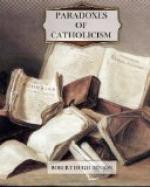The Catholic Church, on the other hand, is essentially a Church of slavery. First, in discipline, an enormous weight of observances and duties is laid upon her children, comparable only to the Pharisaic system. The Catholic must worship in this church and not in that, in this manner and not in the other. He must observe places and days and times, and that not only in religious matters but in secular. He must eat this food on this day and that on the other; he must frequent the sacraments at specified periods; he must perform certain actions and refrain from others, and that in matters in themselves indifferent.
In dogma, too, no less is the burden that he must bear. Not only are the simple words of Christ developed into a vast theological system by the Church’s officials, but the whole of this system is laid, as of faith, down to its minutest details, on the shoulders of the unhappy believer. He may not choose between this or that theory of the mode of Christ’s Presence in the Eucharist; he must accept precisely that, and no other, which his Church has elaborated.
In fact, in doctrine and in discipline alike, the Church has gone back to precisely that old reign of tyranny which Christ abolished. The Catholic, unlike the Protestant who has retained the spirit of liberty, finds himself in the same case as that under which Israel itself once groaned. He is a slave and not a child; he binds his own limbs, as the old phrase says, by his act of faith and puts the other end of the chain into the hands of the priest. Such, in outline, is the charge against us.
* * * * *
Now much of it is so false that it needs no refutation. It is, for example, entirely false that New Testament theology is simple. It is far more true to say that, compared with the systematized theology of the Church, it is bewilderingly complex and puzzling, and how complex and puzzling it is, is indicated by the hundreds of creeds which Protestants have made out of it, each creed claiming, respectively, to be its one and only proper interpretation. Men have only come to think it “simple” in modern days by desperately eliminating from it every element on which all Protestants are not agreed. The residuum is indeed “simple.” Only it is not the New Testament theology! Dogmas such as that of the Blessed Trinity, of the Procession of the Holy Ghost, of the nature of grace and of sin—these, whether as held by orthodox or unorthodox, are at any rate not simple, and it is merely untrue to say that Christ made no statements on these points, however they may be understood. Further, it is merely untrue to say that Protestant theology is “simple”; it is every whit as elaborate as Catholic theology and considerably more complex in those points in which Protestant divines are not agreed. The controversies on Justification in which such men as Calvin and Luther, with their disciples, continually engaged are fully as complicated as any disputations on Grace between Jesuits and Dominicans.




